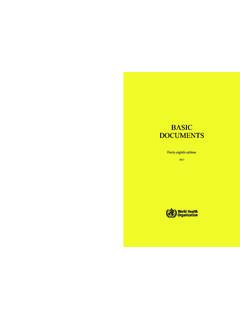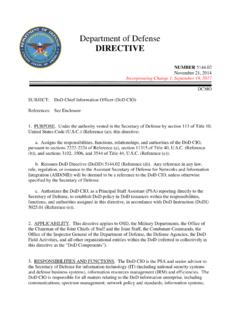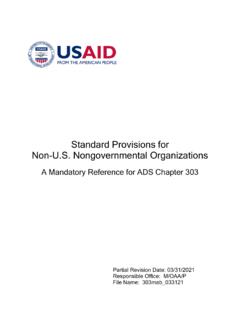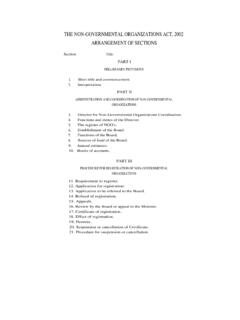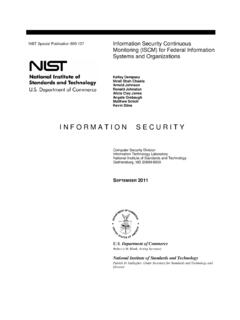Transcription of Production, Information Costs, and Economic Organization
1 Production, Information Costs, and Economic Organization BY ARMEN A. ALCHIAN AND HAROLD DEMSETZ* The mark of a capitalistic society is that resources are owned and allocated by such nongovernmental organizations as firms, households, and markets. Resource owners increase productivity through cooperative specialization and this leads to the demand for Economic organizations which facili- tate cooperation. When a lumber mill employs a cabinetmaker, cooperation be- tween specialists is achieved within a firm, and when a cabinetmaker purchases wood from a lumberman, the cooperation takes place across markets (or between firms). Two important problems face a theory of Economic Organization -to explain the conditions that determine whether the gains from specialization and cooperative production can better be obtained within an Organization like the firm, or across markets, and to explain the structure of the Organization .
2 It is common to see the firm charac- terized by the power to settle issues by fiat, by authority, or by disciplinary action superior to that available in the conven- tional market. This is delusion. The firm does not own all its inputs. It has no power of fiat, no authority, no disciplinary action any different in the slightest degree from ordinary market contracting be- tween any two people. I can "punish" you only by withholding future business or by seeking redress in the courts for any failure to honor our exchange agreement. That is exactly all that any employer can do. He can fire or sue, just as I can fire my grocer by stopping purchases from him or sue him for delivering faulty products. What then is the content of the presumed power to manage and assign workers to various tasks?
3 Exactly the same as one little con- sumer's power to manage and assign his grocer to various tasks. The single con- sumer can assign his grocer to the task of obtaining whatever the customer can in- duce the grocer to provide at a price ac- ceptable to both parties. That is precisely all that an employer can do to an em- ployee. To speak of managing, directing, or assigning workers to various tasks is a deceptive way of noting that the employer continually is involved in renegotiation of contracts on terms that must be acceptable to both parties. Telling an employee to type this letter rather than to file that document is like my telling a grocer to sell me this brand of tuna rather than that brand of bread. I have no contract to con- tinue to purchase from the grocer and neither the employer nor the employee is bound by any contractual obligations to continue their relationship.
4 Long-term contracts between employer and em- ployee are not the essence of the organiza- tion we call a firm. My grocer can count on my returning day after day and pur- chasing his services and goods even with the prices not always marked on the goods -because I know what they are-and he adapts his activity to conform to my directions to him as to what I want each day .. he is not my employee. Wherein then is the relationship be- tween a grocer and his employee different from that between a grocer and his cus- * Professors of economics at the University of Cali- fornia, Los Angeles. Acknowledgment is made for finan- cial aid from the E. Lilly Endowment, Inc. grant to UCLA for research in the behavioral effects of property rights. 777 778 THE AMERICAN Economic REVIEW tomers?
5 It is in a team use of inputs and a centralized position of some party in the contractual arrangements of all other in- puts. It is the centralized contractual agent in a team productive process not some superior authoritarian directive or dis- ciplinary power. Exactly what is a team process and why does it induce the con- tractual form, called the firm? These prob- lems motivate the inquiry of this paper. I. The Metering Problem The Economic Organization through which input owners cooperate will make better use of their comparative advantages to the extent that it facilitates the pay- ment of rewards in accord with produc- tivity. If rewards were random, and with- out regard to productive effort, no in- centive to productive effort would be pro- vided by the Organization ; and if rewards were negatively correlated with produc- tivity the Organization would be subject to sabotage.
6 Two key demands are placed on an Economic Organization -metering input productivity and metering rewards.' Metering problems sometimes can be resolved well through the exchange of products across competitive markets, be- cause in many situations markets yield a high correlation between rewards and productivity. If a farmer increases his out- put of wheat by 10 percent at the pre- vailing market price, his receipts also in- crease by 10 percent. This method of or- ganizing Economic activity meters the output directly, reveals the marginal prod- uct and apportions the rewards to re- source owners in accord with that direct measurement of their outputs. The success of this decentralized, market exchange in promoting productive specialization re- quires that changes in market rewards fall on those responsible for changes in The classic relationship in economics that runs from marginal productivity to the distribution of income implicitly as- sumes the existence of an Organization , be it the market or the firm, that allocates rewards to resources in accord with their productivity.
7 The problem of Economic Organization , the economical means of metering productivity and rewards, is not confronted directly in the classical anal- ysis of production and distribution. In- stead, that analysis tends to assume suf- ficiently Economic or zero cost means, as if productivity automatically created its reward. We conjecture the direction of causation is the reverse the specific sys- I Meter means to measure and also to apportion. One can meter (measure) output and one can also meter (control) the output. We use the word to denote both; the context should indicate which. 2 A producer's wealth would be reduced by the pres- ent capitalized value of the future income lost by loss of reputation. Reputation, , credibility, is an asset, which is another way of saying that reliable Information about expected performance is both a costly and a valuable good.
8 For acts of God that interfere with con- tract performance, both parties have incentives to reach a settlement akin to that which would have been reached if such events had been covered by specific con- tingencv clauses. The reason, again, is that a reputation for "honest" , for actions similar to those that would probably have been reached had the con- tract provided this contingency-is wealth. Almost every contract is open-ended in that many contingencies are uncovered. For example, if a fire delays production of a promised product by A to B, and if B contends that A has not fulfilled the contract, how is the dispute settled and what recompense, if any, does A grant to B? A person uninitiated in such ques- tions may be surprised by the extent to which contracts permit either party to escape performance or to nullify the contract.
9 In fact, it is hard to imagine any contract, which, when taken solely in terms of its stipulations, could not be evaded by one of the parties. Yet that is the ruling, viable type of contract. Why? Undoubtedly the best discussion that we have seen on this question is by Stewart Macaulay. There are means not only of detecting or preventing cheating, but also for deciding how to allocate the losses or gains of unpredictable events or quality of items exchanged. Sales contracts contain warranties, guaran- tees, collateral, return privileges and penalty clauses for specific nonperformance. These are means of assignment of risks of losses of cheating. A lower price without war- ranty-an "as is" purchase-places more of the risk on the buyer while the seller buys insurance against losses of his "cheating.
10 " On the other hand, a warranty or return privilege or service contract places more risk on the seller with insurance being bought by the buyer. ALCHIAN AND DEMSETZ: Economic Organization 779 tem of rewarding which is relied upon stimulates a particular productivity re- sponse. If the Economic Organization meters poorly, with rewards and produc- tivity only loosely correlated, then pro- ductivity will be smaller; but if the eco- nomic Organization meters well produc- tivity will be greater. What makes meter- ing difficult and hence induces means of economizing on metering costs? II. Team Production Two men jointly lift heavy cargo into trucks. Solely by observing the total weight loaded per day, it is impossible to determine each person's marginal pro- ductivity.


